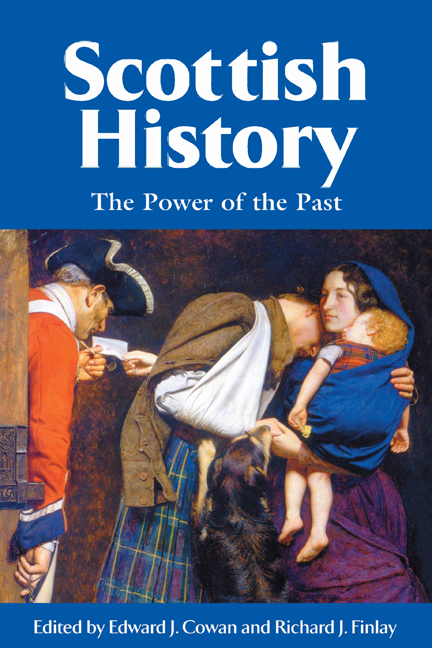Book contents
- Frontmatter
- Contents
- Contributors
- Introduction
- 1 The Picts‘ Place in the Kingship's Past Before John of Fordun
- 2 The Demonisation of King John
- 3 Late Medieval Scotland and the Matter of Britain
- 4 In Search of the Scottish Reformation
- 5 Civil Society and the Celts: Hector Boece, George Buchanan and the Ancient Scottish Past
- 6 The Covenanting Tradition in Scottish History
- 7 ‘What's in a Name?’: Pedigree and Propaganda in Seventeenth-Century Scotland
- 8 The Ideological Uses of the Picts, 1707-c.1990
- 9 The Jacobite Cult
- 10 Queen Victoria and the Cult of Scottish Monarchy
- 11 ‘Their Laurels Wither'd, and their Name Forgot’: Women and the Scottish Radical Tradition
- 12 Tomorrow's Ancestors: Nationalism, Identity and History
- Index
12 - Tomorrow's Ancestors: Nationalism, Identity and History
Published online by Cambridge University Press: 24 September 2020
- Frontmatter
- Contents
- Contributors
- Introduction
- 1 The Picts‘ Place in the Kingship's Past Before John of Fordun
- 2 The Demonisation of King John
- 3 Late Medieval Scotland and the Matter of Britain
- 4 In Search of the Scottish Reformation
- 5 Civil Society and the Celts: Hector Boece, George Buchanan and the Ancient Scottish Past
- 6 The Covenanting Tradition in Scottish History
- 7 ‘What's in a Name?’: Pedigree and Propaganda in Seventeenth-Century Scotland
- 8 The Ideological Uses of the Picts, 1707-c.1990
- 9 The Jacobite Cult
- 10 Queen Victoria and the Cult of Scottish Monarchy
- 11 ‘Their Laurels Wither'd, and their Name Forgot’: Women and the Scottish Radical Tradition
- 12 Tomorrow's Ancestors: Nationalism, Identity and History
- Index
Summary
‘The Scottish parliament, adjourned on 25 March 1707, is hereby reconvened.’
When Winnie Ewing, as mother of the house and temporary presiding officer, uttered these words on Wednesday, 13 May 1999 to open the Scottish parliament who could doubt the political potency of history: history regained? While one might take issue with the assumption that a devolved parliament is tantamount to the real thing - and no doubt Mrs Ewing was quite aware of that - this was the reclaiming of history. It was of course then reinforced by a number of MSPs prefacing their oath of allegiance by reference to an older claim of right to the sovereignty of the people rather than the crown, once more mobilising history in the interests of contemporary politics.
These are contentious issues, but central to the theme of this chapter: getting history right or wrong takes second place to the power, the charge, of history. Let us begin with the French historian Ernest Renan's phrase ‘getting history wrong’: Renan's famous essay ‘What is a Nation?’ places ‘history’ at the centre of the nationalist project, but it is a history which requires careful interpretation. ‘Getting history wrong’ is the precondition of nationalist history because it requires not only collective remembering but also collective forgetting. This ‘forgetting,’ said Renan, ‘I would go so far to say historical error, is a crucial factor in the creation of a nation, which is why progress in historical studies often constitutes a danger for [the principle of] nationality’.
This makes it sound as though only nationalists are bad historians, but Renan was making a more general point. Renan was himself, as a French citizen, making a ‘nationalist’ claim, as he delivered his lecture at the Sorbonne in 1882, in the aftermath of the Franco-Prussian War after which Alsace and Lorraine were annexed by the Prussian state. Renan's remark that nationalism requires a ‘daily plebiscite’ was also made in the course of this lecture to counter the view that these territories were ‘objectively’ part of the Reich. Not so, said Renan, for governance requires the active and ongoing commitment of people - a ‘daily plebiscite’. We will return to Renan's seminal essay later in this chapter, for he provided an analysis which was remarkably prescient and modern.
- Type
- Chapter
- Information
- Scottish HistoryThe Power of the Past, pp. 253 - 272Publisher: Edinburgh University PressPrint publication year: 2020

